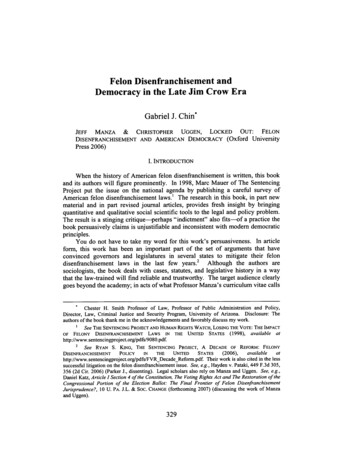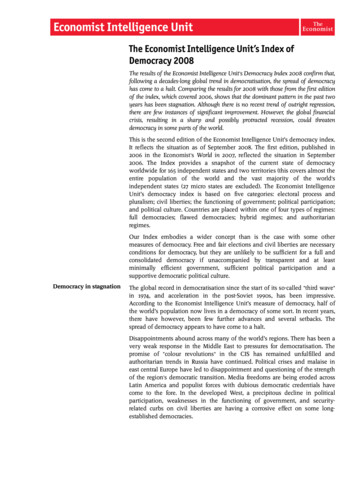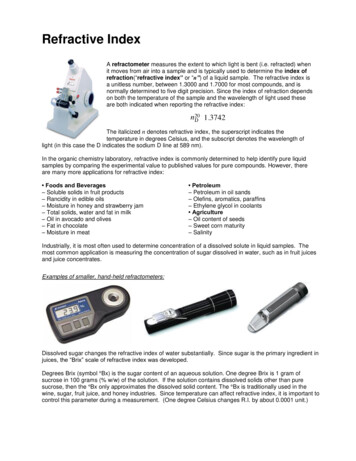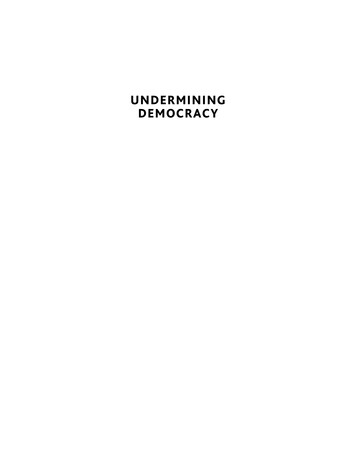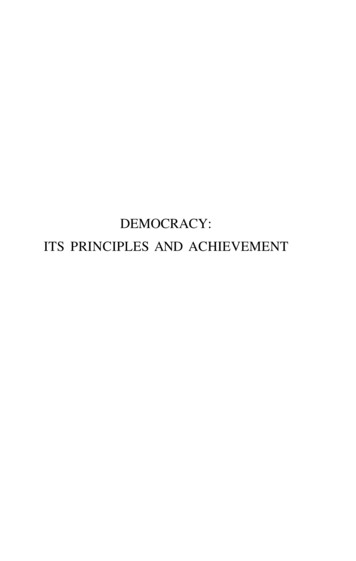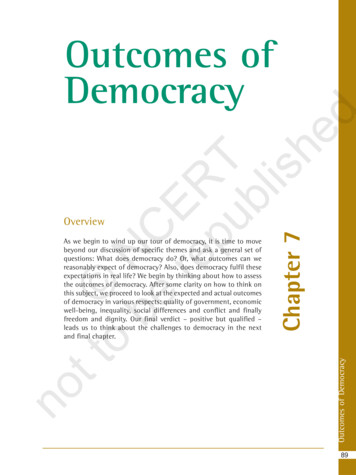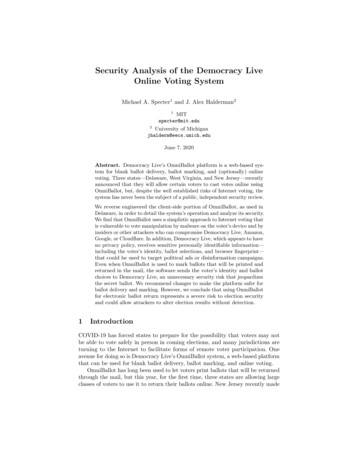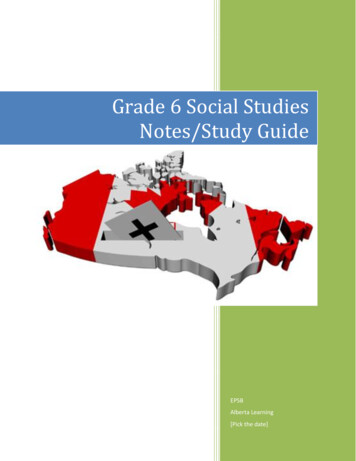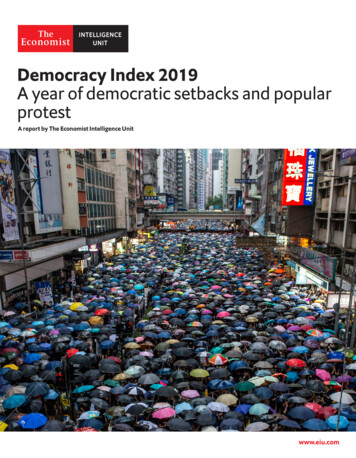
Transcription
Democracy Index 2019A year of democratic setbacks and popularprotestA report by The Economist Intelligence Unitwww.eiu.com
The world leader in global business intelligenceThe Economist Intelligence Unit (The EIU) is the research and analysis division of The Economist Group, the sister companyto The Economist newspaper. Created in 1946, we have over 70 years’ experience in helping businesses, financial firms andgovernments to understand how the world is changing and how that creates opportunities to be seized and risks to be managed.Given that many of the issues facing the world have an international (if not global) dimension, The EIU is ideally positioned to becommentator, interpreter and forecaster on the phenomenon of globalisation as it gathers pace and impact.EIU subscription servicesThe world’s leading organisations rely on our subscription services for data, analysis and forecasts to keep them informed aboutwhat is happening around the world. We specialise in: C ountry Analysis: Access to regular, detailed country-specific economic and political forecasts, as well as assessments ofthe business and regulatory environments in different markets. R isk Analysis: Our risk services identify actual and potential threats around the world and help our clients understand theimplications for their organisations. I ndustry Analysis: Five year forecasts, analysis of key themes and news analysis for six key industries in 60 majoreconomies. These forecasts are based on the latest data and in-depth analysis of industry trends.EIU ConsultingEIU Consulting is a bespoke service designed to provide solutions specific to our customers’ needs. We specialise in these keysectors: H ealthcare: Together with our two specialised consultancies, Bazian and Clearstate, The EIU helps healthcare organisationsbuild and maintain successful and sustainable businesses across the healthcare ecosystem. Find out more at: eiu.com/healthcare P ublic Policy: Trusted by the sector’s most influential stakeholders, our global public policy practice provides evidencebased research for policy-makers and stakeholders seeking clear and measurable outcomes. Find out more at: eiu.com/publicpolicyThe Economist Corporate NetworkThe Economist Corporate Network (ECN) is The Economist Group’s advisory service for organisational leaders seeking to betterunderstand the economic and business environments of global markets. Delivering independent, thought-provoking content,ECN provides clients with the knowledge, insight, and interaction that support better-informed strategies and decisions.The Network is part of The Economist Intelligence Unit and is led by experts with in-depth understanding of the geographies andmarkets they oversee. The Network’s membership-based operations cover Asia-Pacific, the Middle East, and Africa. Through adistinctive blend of interactive conferences, specially designed events, C-suite discussions, member briefings, and high-calibreresearch, The Economist Corporate Network delivers a range of macro (global, regional, national, and territorial) as well asindustry-focused analysis on prevailing conditions and forecast trends.
DEMOCRACY INDEX 2019A YEAR OF DEMOCRATIC SETBACKS AND POPULAR PROTESTContentsList of tables 2Introduction 3Democracy Index 2019 highlights 15Democracy around the regions in 2019 23Asia and Australasia 25Eastern Europe 30Latin America 33The Middle East and North Africa 36North America 40Sub-Saharan Africa 43Western Europe 46Appendix Defining and measuring democracy 5050Methodology 521The Economist Intelligence Unit model 55References and bibliography 65 The Economist Intelligence Unit Limited 2020
DEMOCRACY INDEX 2019A YEAR OF DEMOCRATIC SETBACKS AND POPULAR PROTESTList of tables and chartsTable 1 Democracy Index 2019, by regime typeChart 1 Democracy Index 2019, global map by regime typeChart 2: Evolution of democracy by category, 2008-19Table 2 Democracy Index 2019, regional category scoresTable 3 Democracy Index 2006-19Table 4 Democracy across the regions 2019, by regime typeChart 3 Democracy Index change over time 2006-19Table 5 Democracy Index 2006-19 by regionTable 6 Asia & Australasia 2019, regional rankingChart 4 Asia & Australasia, Democracy Index 2019 by categoryTable 7 Eastern Europe 2019, regional rankingChart 5 Eastern Europe, Democracy Index 2019 by categoryTable 8 Latin America & the Caribbean 2019, regional rankingChart 6 Latin America & the Caribbean, Democracy Index 2019 by categoryTable 9 Middle East & North Africa 2019, regional rankingChart 7 Middle East & North Africa, Democracy Index 2019 by categoryTable 10 North America 2019, regional rankingChart 8 North America, Democracy Index 2019 by categoryTable 11 Sub-Saharan Africa 2019, regional rankingChart 9 Sub-Saharan Africa 2019, Democracy Index 2019 by categoryTable 12 Western Europe 2019, regional rankingChart 10 Western Europe, Democracy Index 2019 by category2 The Economist Intelligence Unit Limited 2020
DEMOCRACY INDEX 2019A YEAR OF DEMOCRATIC SETBACKS AND POPULAR PROTESTIntroductionThe Economist Intelligence Unit’s Democracy Index provides a snapshot of the state of democracyworldwide in 165 independent states and two territories. This covers almost the entire population ofthe world and the vast majority of the world’s states (microstates are excluded). The Democracy Indexis based on five categories: electoral process and pluralism; the functioning of government; politicalparticipation; political culture; and civil liberties. Based on its scores on a range of indicators withinthese categories, each country is then itself classified as one of four types of regime: “full democracy”,“flawed democracy”, “hybrid regime” or “authoritarian regime”. A full methodology and explanationscan be found in the Appendix.This is the 12th edition of the Democracy Index, which began in 2006, and it records how globaldemocracy fared in 2019. The global results are discussed in this introduction, and the results by regionare analysed in greater detail in the section entitled Democracy around the regions in 2019 (see page23). According to The Economist Intelligence Unit’s measure of democracy, almost one-half (48.4%) ofthe world’s population live in a democracy of some sort, although only 5.7% reside in a “full democracy”,down from 8.9% in 2015 as a result of the US being demoted from a “full democracy” to a “flaweddemocracy” in 2016. More than one-third of the world’s population live under authoritarian rule, with alarge share being in China.Table 1Democracy Index 2019, by regime typeNo. of countries% of countries% of world populationFull democracies2213.25.7Flawed democracies5432.342.7Hybrid regimes3722.216.0Authoritarian regimes5432.335.6Note. “World” population refers to the total population of the 167 countries covered by the Index. Since this excludes only micro states, thisis nearly equal to the entire estimated world population.Source: The Economist Intelligence Unit.According to the 2019 Democracy Index, 76 of the 167 countries covered by the model, or 45.5% ofall countries, can be considered to be democracies. The number of “full democracies” increased to 22in 2019, up from 20 in 2018, as Chile, France and Portugal joined the top-ranked countries (those scoringmore than 8.00), while Malta was relegated to“The global march of democracy stalledthe “flawed democracy” category. The numberin the 2000s and retreated in the secondof “flawed democracies” fell by one to 54 in 2019.decade of the 21st century. But theOf the remaining 91 countries in our index, 54 arerecent wave of protest in the developing“authoritarian regimes”, up from 52 in 2018, andworld and the populist insurgency in the37 are classified as “hybrid regimes”, down frommature democracies show the potential39 in 2018. (For a full explanation of the indexfor democratic renewal.”Joan Hoey, Editor, The Democracy Indexmethodology and categories, see page 52.)3 The Economist Intelligence Unit Limited 2020
DEMOCRACY INDEX 2019A YEAR OF DEMOCRATIC SETBACKS AND POPULAR PROTESTA year of democratic setbacks and global protestIn the 2019 Democracy Index the average global score for democracy fell from 5.48 in 2018 to 5.44 (ona scale of 0-10). This is the worst average global score since the index was first produced in 2006. The2019 result is even worse than that recorded in 2010, in the wake of the global economic and financialcrisis, when the average global score fell to 5.46. From 2011 onwards the average global score recordeda gradual, modest annual improvement, but in 2015 and 2018 the score stagnated, and in 2016 and 2019it declined.The decline in the average global score in 2019 was driven by a sharp regression in Latin America andSub-Saharan Africa, a lesser one in the Middle East and North Africa (MENA) region, and by stagnationin the remaining four regions covered by the Democracy Index. Latin America was the worstperforming region in 2019, recording a fall of 0.11 points in its average regional score compared with2018, to 6.13. Starting from an already low base, the regression in Sub-Saharan Africa was also striking:the average regional score fell by 0.10 points year on year, to 4.26. The democratic deterioration in theMENA region was more modest but followed a trend of steady regression that started in 2012, whenthe gains of the Arab Spring began to be reversed. In the 2019 Democracy Index three regions stoodstill in terms of their average scores, as gains in some countries and categories were erased by setbacksin others. Asia and Australasia and eastern and western Europe all failed to make headway in theDemocracy Index in 2019. The exception to the regression rule in 2019 was North America (Canada andthe US), whose average regional score moved up by 0.03 points because of a modest improvement inCanada’s score.In 2019 some 68 countries experienced a decline in their total score compared with 2018, butalmost as many (65) recorded an improvement. The other 34 stagnated, with their scores remainingunchanged compared with 2018. There were some impressive improvements and some dramaticdeclines, as discussed in the Highlights section, with Thailand registering the biggest improvementin score and China the greatest decline. There were ten changes of regime category, six of thempositive and four negative. Three countries (Chile, France and Portugal) moved from the “flaweddemocracy” category to be classified as “full democracies”. Malta moved in the opposite direction,falling out of the “full democracy” category to become a “flawed democracy”. At the other end ofthe democracy spectrum, Iraq and Palestine moved from being classified as “hybrid regimes” to“authoritarian regimes”. Algeria moved from being classified as an “authoritarian regime” to the “hybridregime” category. El Salvador and Thailand moved out of the “hybrid regime” category into the “flaweddemocracy” category, while Senegal moved in the opposite direction, from being a “flawed democracy”to a “hybrid regime”.4 The Economist Intelligence Unit Limited 2020
DEMOCRACY INDEX 2019A YEAR OF DEMOCRATIC SETBACKS AND POPULAR PROTESTChart 1: Democracy Index 2019, global map by regime typeFull democracy9.0 – 10.08.0 – 9.0Flawed democracy7.0 – 8.06.0 – 7.0Hybrid regime5.0 – 6.04.0 – 5.0Authoritarian regime3.0 – 4.02.0 – 3.00 – 2.0No dataSource: The Economist Intelligence Unit.What lies behind the global democratic regression?Surveys by the Pew Research Center on global attitudes towards democracy have in recent yearsrevealed a disjuncture between still-high levels of public support for democracy across the globeand deep popular disappointment with the functioning of democracy and systems of politicalrepresentation. Since the inception of the Democracy Index in 2006 we have highlighted theprogressive deterioration in the practice of democracy in the most developed democracies in theWest. According to Larry Diamond, a renowned democracy scholar, “we have been going through ademocracy recession”, and he points to a trend towards authoritarianism in the developing world.The Economist Intelligence Unit’s Democracy Index has also noted these trends towardsauthoritarian rule in the non-OECD regions. However, our focus has been much more on the growingdemocratic deficit in the developed world, which we have discussed at some length in recent editionsof the Democracy Index (see for example, Democracy Index 2016, Revenge of the deplorables).5 The Economist Intelligence Unit Limited 2020
DEMOCRACY INDEX 2019A YEAR OF DEMOCRATIC SETBACKS AND POPULAR PROTESTA regression and/or stagnation of democracy has been reflected in the declining average scores forthe advanced democracies of the US and Europe over many years. In our view, the main manifestationsof this democracy recession include:l an increasing emphasis on elite/expert governance rather than popular participatorydemocracy;l a growing influence of unelected, unaccountable institutions and expert bodies;l the removal of substantive issues of national importance from the political arena to bedecided by politicians, experts or supranational bodies behind closed doors;l a widening gap between political elites and parties on the one hand and national electorateson the other; andl a decline in civil liberties, including media freedom and freedom of speech.These regressive trends in the mature democracies developed from the 1990s onwards, acceleratedin the 2000s and reached their apogee in the decade that closed in 2019.In the mature democracies the result was an unsustainable political status quo: the increasingvacuity of national politics and the retreat of political elites and parties from engagement withtheir electorates resulted in falling levels of popular trust in political institutions and parties,declining political engagement, and a growing resentment among electorates at the lack of politicalrepresentation. Eventually the alienation of people from the 21st-century body politic gave rise topopulist movements, which repudiated the mainstream political parties and demanded a new politicalcontract between the people and their elected representatives.More developed emerging market democracies in Asia, eastern Europe and Latin America sharesome of the democratic deficits that characterise the mature democracies in the West. There toopopular protest movements have emerged in recent years demanding change, as we discuss belowin relation to 2019. The democratic deficits in the CIS region of eastern Europe, the MENA regionand much of Sub-Saharan Africa are more fundamental, and protests in those regions often expresspopular aspirations for elementary democratic rights and basic freedoms.Popular disappointment with the functioning of democracy across the developed and developingworld can be explained by the worsening in the average global score across all but one of the fivecategories of the Democracy Index in recent years, a trend that continued in 2019. The five categoriesacross which all countries are assessed are: electoral process and pluralism; the functioning ofgovernment; political participation; political culture; and civil liberties.The average global scores for all categories of the Democracy Index with the exception of politicalparticipation have fallen almost sequentially since 2012. Compared with 2008, the first year for whichcomparable data are available, the average category scores have fallen significantly. The biggest declinehas been for civil liberties, the score for which fell from 6.35 in 2008 to 5.74 in 2019. This decline wasrecorded across all regions of the world, without exception, with the biggest being recorded in LatinAmerica whose average score fell by 0.75 points between 2011 and 2019. Eastern Europe recordedthe second biggest decline in its civil liberties score (of 0.66 points) during this period. The smallestdecline (0.29 points) was in North America. In Western Europe, where infringements of free speech6 The Economist Intelligence Unit Limited 2020
DEMOCRACY INDEX 2019A YEAR OF DEMOCRATIC SETBACKS AND POPULAR PROTESTChart 2: Evolution of democracy by category, 2008-19(Index score out of 10, 10 being ipationFunctioning ofgovernmentElectoral processand 0200810111213141516171819Source: The Economist Intelligence Unit.and religious freedom have increased, the average score declined sharply (by 0.42 points) over thesame period. As highlighted in the Democracy Index 2017: Free speech under attack, free speech isincreasingly being restricted by both state and non-state actors. In the past decade, in fact, no scoresin the Democracy Index have deteriorated as much as those related to freedom of expression andmedia freedom.The second-worst-performing category over the past decade has been electoral process andpluralism, the score for which deteriorated by 0.10 in 2019 compared with 2018, continuing years ofsteady decline. The average global score for this category has fallen from 6.07 in 2008 to 5.80 in 2019,with most of the regression being concentrated in developing regions such as Asia, eastern Europe,Latin America and Sub-Saharan Africa. Latin America’s average score in this category is higher thanthat of other emerging-market regions but lags significantly behind those for the developed world;it has also fallen sharply since 2011, from 8.20 to 7.48. The developed democracies of North Americaand western Europe continue to score highly in this category, but western Europe’s average score hasdeclined steadily year by year. The average global score is dragged down by the very poor scores in thiscategory in the MENA region (2.50) and Sub-Saharan Africa (3.99).The functioning of government category is the lowest-scoring category in the Democracy Index,with an average global score of 4.81 in 2019, down from 5.00 in 2008. Asia (5.81), Latin America (5.40) andeastern Europe (4.54) have struggled to improve their performance in this category. Indeed they haveregressed in recent years. The consistently low scores for transparency, accountability and corruption inthe developing world explain much of the underperformance. In all of these areas there was little or noprogress in 2019, and government failures in these areas help to explain the upsurge of political protestand social unrest in the developing regions in 2019. The MENA region (2.84) and Sub-Saharan Africa(3.27) perform very poorly in this area.7 The Economist Intelligence Unit Limited 2020
DEMOCRACY INDEX 2019A YEAR OF DEMOCRATIC SETBACKS AND POPULAR PROTESTIt is in the functioning of government category that the advanced democracies have also struggledin recent years and registered regressions in their scores. Western Europe averages only 7.95 inthis category, while the score for the US was even lower, at 7.14 in 2019. Government dysfunction,insufficient transparency and a lack of accountability help to explain the relatively low scores for themature democracies in this category. However, the questions which have dragged down the countryand regional scores in this category are those that pertain to popular perceptions of control; publicconfidence in government; and public confidence in political parties. In the worst-scoring question inthe functioning of government category (and in the entire index), concerning popular confidence inpolitical parties, the score fell once again in 2019.There has been a decline in the average global score for the political culture category between 2008and 2019, from 5.73 to 5.57, a smaller regression compared with other categories. The trajectory ofthe score over this period has also been less linear and more lumpy. Disillusionment with traditionalpolitical parties which have failed to address weaknesses in the practice of democracy has underminedconfidence in democracy itself, as revealed in surveys by Eurobarometer, Latinobarómetro,Afrobarometer, Gallup, Pew and others. In our Democracy Index the score for popular perceptions ofdemocracy has fallen in recent years. There has also been a notable decline in the score relating to thedegree of societal consensus and cohesion necessary to support democracy.Democratic backsliding, popular protestThe one category which has recorded a steady and significant upward trajectory is politicalparticipation, for which the average global score has risen from 4.59 in 2008 to 5.28 in 2019. Withthe exception of North America, whose average score for political participation fell from 7.78 in2011 to 7.50 in 2019, every region has recorded an improvement in this category over the same timeperiod. Admittedly, the improvement has been from a low base, indicating one of the most damningweaknesses of democracy around the globe; the average global score for political participation is thesecond-lowest of all the categories, after that for functioning of government. The improvement in theaverage score for political participation over the past decade is in our view correlated with the paralleldeterioration in the scores for electoral process and pluralism, functioning of government and civilliberties. The failures of “actually existing democracy” in the developing and developed world haveinspired millions of people who aspire to have a better version of democracy, to become engaged, andto demand change.As discussed in the section Democracy around the regions (see page 23), following a popularbacklash against “actually existing democracy” in the developed democracies in recent years, publicdissatisfaction with the political status quo boiled over in many places in the developing world in 2019. Arising tide of popular protest shook regimes run by despots and democrats alike in Asia, Latin Americaand the Caribbean, the MENA region and in Sub-Saharan Africa. The willingness of populations to taketo the streets to express their opposition to the established order, to protest against official measures,unjust laws and corruption and to demand change resulted in improved scores for political participationin many countries and across the regions.8 The Economist Intelligence Unit Limited 2020
DEMOCRACY INDEX 2019A YEAR OF DEMOCRATIC SETBACKS AND POPULAR PROTESTEconomic distress is almost a necessary precondition for serious instability, but in itself is not asufficient one, and the protests of 2019 also had clear political mainsprings. Declines in incomes arenot always followed by unrest. It is only when economic distress is accompanied by other structuralfeatures of vulnerability that there is a high risk of instability. The underlying vulnerability to unrestdepends on a host of factors, including the degree of income inequality, the state of governance, levelsof social provision, ethnic tensions, public trust in institutions, and a history of unrest. What appears tobe decisive in firing unrest is the erosion of trust in governments, institutions, parties and politicians—what is generally termed “the crisis of democracy”. It is only by giving due consideration to this politicaldimension that we can understand the mainsprings of protest and see the common denominators ofseemingly diverse protests.In Latin America, mass protests erupted in 2019 in numerous countries, including Bolivia, Chile,Colombia, Ecuador, Haiti and Venezuela. The drivers of these protests varied from clashes overelectoral fraud to demonstrations against corruption and austerity measures. All expressed distrustin the political class and dissension from governments’ policy decisions. In some cases, for example inChile, a single issue, such as a government fare hike for Santiago’s metro system, became a lightning rodfor other grievances. Dysfunctional political systems and the failure of governments to address voterconcerns led to an improvement in political participation across the region, as growing numbers ofcitizens voiced their dissatisfaction with the status quo and demanded change.Hong Kong was the epicentre of protest in Asia. What began as a protest against proposedamendments to Hong Kong’s extradition law soon morphed into a campaign for more democracy.After starting out by demanding that the local government drop the extradition legislation, protestorsended up calling for universal suffrage. The protests also gave expression to other concerns, forexample about the increasing influence of central government on local matters, including thosepertaining to freedom of expression.More upheaval in the MENA regionRising popular frustration with the political status quo in several countries led to growing publicprotests in the MENA region in 2019, including in Algeria, Lebanon, Iraq, Iran and Sudan, continuing atrend that started in 2018. These protests led to regime change in some countries or elections in the lessauthoritarian systems. In other countries populations joined demonstrations to express dissatisfactionwith the slow pace of political and economic change.Sub-Saharan Africa experienced its fair share of protests in 2019, including in Cameroon, Ethiopia,Nigeria and South Africa. Disillusioned and incensed citizens expressed their anger and frustrationwith national leaders over painfully slow progress on a range of economic, political and social issues.The protests differed from place to place, but the participants were inspired by common themes. Inparticular, protests were driven by frustration with a government that was seen as corrupt and selfserving, and unwilling or unable to tackle the political and socioeconomic inequalities facing its people.The new populist movements in the developed world and the upsurge of popular protests in thedeveloping world hold out the potential for a regeneration of democracy. At the heart of the populistinsurgency has been a demand for more popular sovereignty and political representation. These arealso concerns for protestors in the emerging-market regions, whose demands for government action totackle corruption, economic and social inequalities and human rights abuses can be met only throughgreater democratisation.9 The Economist Intelligence Unit Limited 2020
DEMOCRACY INDEX 2019A YEAR OF DEMOCRATIC SETBACKS AND POPULAR PROTESTTable 2Democracy Index 2019Overall ScoreRankElectoralprocess andpluralismFunctioning ofgovernmentPoliticalparticipationPolitical cultureCivil libertiesFull 10.009.41New 00Denmark9.227 10.009.298.339.389.12Canada9.227 United 08.576.117.509.71Austria8.2916 9.587.868.336.888.82Spain8.2916 59.41Costa l8.03229.587.866.117.509.12South Korea8.00239.177.867.227.508.24Flawed democracy10Japan7.99248.758.216.677.508.82United States of 46.117.509.12Cabo 16.115.639.12Czech taly7.52359.586.077.786.257.94Slovenia7.5036 9.586.796.676.258.24Lithuania7.5036 9.586.436.116.259.12 The Economist Intelligence Unit Limited 2020
DEMOCRACY INDEX 2019A YEAR OF DEMOCRATIC SETBACKS AND POPULAR PROTESTTable 2Democracy Index 201911Overall ScoreRankElectoralprocess andpluralismFunctioning ofgovernmentPoliticalparticipationPolitical cultureCivil 3399.584.866.677.508.53South .94Malaysia7.1643 9.177.866.676.255.88Trinidad and Tobago7.1643 87.06Ghana6.6355 8.335.716.676.256.18Hungary6.6355 .075.565.007.06Dominican Republic6.5460 9.175.366.115.007.06Lesotho6.5460 6.47Sri .715.004.387.35El Salvador6.1571 9.174.646.113.757.06Guyana6.1571 18Papua New Guinea6.03746.926.073.895.637.65Hong Kong6.0275 3.584.366.117.508.53Singapore6.0275 3.927.865.006.257.06 The Economist Intelligence Unit Limited 2020
DEMOCRACY INDEX 2019A YEAR OF DEMOCRATIC SETBACKS AND POPULAR PROTESTTable 2Democracy Index 2019Overall ScoreRankElectoralprocess andpluralismFunctioning ofgovernmentPoliticalparticipationPolitical cultureCivil libertiesHybrid regime12North 6.084.295.006.255.88Liberia5.
The Economist Corporate Network The Economist Corporate Network (ECN) is The Economist Group’s advisory service for organisational leaders seeking to better understand the economic and business environments of global ma

